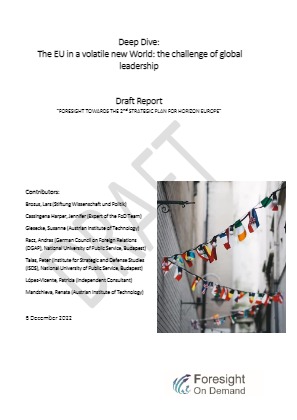Background
An increasingly volatile global geopolitical context is emerging with growing threats not only to global security and governance but also to the EU and neighbourhood countries. Developments in the world and NATO point to Europe’s vulnerability – one that has long been explained, but had yet to be taken seriously. The Russian invasion of Ukraine brought home the realization that the world system is at a crossroads. Talk of multi-polarity, turbulence and possible configurations of the global system has combined with the concern about the future actorness of the EU, or as the 2021 Strategic Foresight Report of the European Commission puts it: “the EU’s capacity and freedom to act”.
If new international blocks and confrontations emerge, this disruption might even go beyond Europe, threatening traditional values, as well as lives and material prosperity of many. While the sudden changes are pushing the EU to reassess its defense capabilities and take a military stance by providing weapons to Ukraine, they must also be seen against the backdrop of an accelerating climate crisis. Impacts of climate change are a direct threat to many regions in the EU, but they also put indirect pressure on migration and the economy. As the war is fueling climate change drivers, many Europeans are torn between contradictory moods: indifference and solidarity, fragmentation and cohesion, empowerment and desperation.
A important driver affecting the EU’s capacity to act is the US foreign policy. Will the US maintain its military influence in Europe, delivering weapons, personnel, and intelligence, as well as pursuing its interests in Eastern Europe or will it take a post-hegemonic position, withdrawing from the continent and leaving conflict resolution up to the EU and the rest of NATO? Such geopolitical reconfigurations are closely entangled with the domestic developments in the US. The EU’s dependence on the transatlantic partnership and NATO is both a source of strength and weakness. As the recent period has shown, an un-cooperative US President and an ambivalent US-China relationship might put the US in a position of dictating terms to the EU in the context of major geopolitical upheaval and reconfigurations, where the rise of new regional powers and the emergence of new actors create uncertainty about future coalitions.
However, the EU is vulnerable along several further dimensions: from access to resources to insufficient capabilities in key technologies including military technologies and dependence on the US for military deterrence, as well as on China for some basic communication technologies. The EU is faced with the urgency of reducing its economic and technological dependencies but the situation remains
delicate in the view of possible shifts in the US government policies and continued dependence on natural resources from other parts of the world. In taking on a more ethical global stance, the EU opens itself up to criticism about double standards and inconsistencies in its policy narratives.
There are already efforts underway to improve the preparedness and make the EU more ‘futureproof’, for instance by anticipating consequences of, and testing responses to, possible shocks and crises. While the EU is frequently assumed to be in a position to claim technological leadership, the arising key question is whether it will rethink its investment focus towards specific dual-use technologies, thus creating capabilities and becoming competitive in the domain of military technologies and industry.
These (and other) uncertainties feed the fear of the future and gives rise to the new geo-political realism: weaponization of everything, increased budgets for deterrence and budget cuts on sociopolitical matters. Accompanying energy shortages and reversing climate neutral energy policies are contributing to the looming economic crisis and societal fragmentation. A central question of the
near and long-term future is: what will the geopolitical power distribution look like?
This report sketches some alternative scenarios of how the geopolitical reconfiguration might evolve in the coming 15 to 20 years. It is based on the work of a team of experts, covering different aspects of geopolitical reconfigurations and future challenges for the EU’s positioning. Next to individual papers as inputs to this report, several virtual and one in-person workshop were organised for further developing and consolidation of the main drivers as well as for developing diverging scenarios on the future of geopolitics and the role of the EU. Additional experts were included in the work as well and consulted to give feedback. A dedicated workshop with EU foresight experts from the Commission services and the member states, helped to provide important insights to complete the scenario development and outline some key policy options.
Geopolitical Reconfiguration: The EU in a volatile new World - the challenge of global leadership
Scenarios and Policy Implications
Publication Date:2022 November


